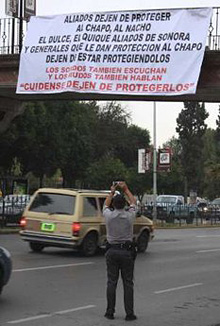
|  |  |  Editorials | Issues | August 2008 Editorials | Issues | August 2008  
Banners Suggest Cartel Shielded by Government
 Sean Mattson - San Antonio Express-News Sean Mattson - San Antonio Express-News
go to original


| | A police officer takes pictures of a banner draped from a commuter bridge in Saltillo, in the Mexican state of Coahuila August 26, 2008. The banner reads "Allies stop protecting 'Shorty', Candy, Nacho, Quique... allies of Sonora and army generals who protect 'Shorty' must stop protecting them. Deaf hear and the blind see. Beware, stop protecting them". (Reuters/Zocalo de Saltillo) | | |
Monterrey, Mexico — Narco gangs have again plastered Mexican cities with banners accusing the government and army of protecting a rival drug cartel and its reputed fugitive leader.

Banners appeared over the past two nights in cities bordering Texas, including Reynosa, Ciudad Acuña, Nuevo Laredo and Piedras Negras, as well as the Yucatán Peninsula resort of Cancún and the states of Veracruz, Aguascalientes and San Luis Potosí, according to various media reports.

The banners alluded to a long-standing conspiracy theory: that Joaquín “El Chapo” Guzmán, who is considered the capo of the Sinaloa Cartel, is still free and in business due to government support.

One of a half-dozen banners strung in Monterrey on Tuesday was placed in the main downtown square right beside City Hall.

“So citizens are made aware of the corruption in the Mexican army and the president,” read the cloth banner, naming Guzmán and others in black, hand-painted script. It suggested authorities didn't fight them “in exchange for juicy sums of money.”

The newspaper El Norte's Web site showed soldiers taking down print shop-quality banners strung Wednesday on main thoroughfares in Reynosa, across the border from McAllen. One featured a photograph of President Felipe Calderón with his predecessor, Vicente Fox.

The Ministry of Defense, which runs the armed forces, and Calderón's office did not immediately comment.

The banners were similar in content to ones found earlier this year in the states of Chihuahua and Sinaloa. It is believed that a breakaway faction of the Sinaloa cartel or the Juárez cartel are behind the banners, which analysts called a new public relations tool for Mexico's drug gangs.

“These banners announce (gangs') presence, it's kind of a macho-strutting ... It is a sign that not the public authorities, not the government, (but) that (the gangs) are in some sense in control of the street,” said Bruce Bagley, the international studies department head at the University of Miami and an expert on drug trafficking issues.

By midday Wednesday, banners had reportedly appeared in eight states. Police apparently made no arrests, even though many of the banners were hung in daylight in heavily policed areas.

Guzmán, whose nickname means “Shorty,” became the envy of Mexican drug lords when he escaped from federal prison in 2001 in a laundry truck.

“I believe (authorities) have hit all the cartels but ... public opinion has the idea that when a drug capo is not captured it is because (authorities) don't want to, not because they cannot,” said Jorge Chabat, a national security expert at CIDE, a Mexico City university. |

 |
|  |



